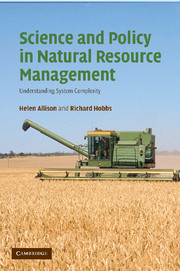Book contents
- Frontmatter
- Contents
- List of illustrations
- List of tables
- Foreword
- Preface
- Acknowledgements
- List of abbreviations
- 1 Introduction
- 2 Historical and policy context
- 3 Natural resource degradation: a resistant problem of the twentieth century
- 4 The epistemology of natural resource management of the twentieth century
- 5 A contemporary epistemology and framework for natural resource management of the twenty-first century
- 6 Model conceptualisation of the Western Australian agricultural region. Part 1: resilience analysis
- 7 Model conceptualisation of the Western Australian agricultural region. Part 2: system dynamics
- 8 Synthesis
- Epilogue
- Glossary
- References
- Index
6 - Model conceptualisation of the Western Australian agricultural region. Part 1: resilience analysis
Published online by Cambridge University Press: 01 March 2010
- Frontmatter
- Contents
- List of illustrations
- List of tables
- Foreword
- Preface
- Acknowledgements
- List of abbreviations
- 1 Introduction
- 2 Historical and policy context
- 3 Natural resource degradation: a resistant problem of the twentieth century
- 4 The epistemology of natural resource management of the twentieth century
- 5 A contemporary epistemology and framework for natural resource management of the twenty-first century
- 6 Model conceptualisation of the Western Australian agricultural region. Part 1: resilience analysis
- 7 Model conceptualisation of the Western Australian agricultural region. Part 2: system dynamics
- 8 Synthesis
- Epilogue
- Glossary
- References
- Index
Summary
… our purpose is to develop an integrative theory to help us understand the changes occurring globally. We seek to understand the source and role of change in systems – particularly the kinds of changes that are transforming, in systems that are adaptive. Such changes are economic, ecological, social and evolutionary. They concern rapidly unfolding processes and slowly changing ones – gradual change and episodic change, local and global changes.
C. S. (Buzz) Holling, Lance H. Gunderson and Donald Ludwig, 2002Introduction
A new paradigm, post-normal science based on systems thinking, has been developed and continues to evolve. It is being promoted and adopted as a means to understand decision-making processes under conditions of uncertainty and counterintuitive behaviour of complex linked social, ecological and economic systems (Funtowicz and Ravetz, 1992; Jasanoff et al., 1997; Kinzig et al.; Gunderson and Holling, 2002). The principles, theory concepts and language of this paradigm are contributing to the considerable effort now being directed towards meeting the real world challenges of policy development and management for sustainable natural resources management from the perspective of social-ecological systems (SESs).
The WA agricultural region is an example of a SES with a history of agriculture of over 116 years described in Chapter 2. The region has successively been changed from a highly biologically diverse system dominated by perennial native vegetation to one dominated by annual cropping systems contributing to the regional, state and national economies. However, this has come at a cost. The negative environmental impacts of the dominant land management practices are now well documented (Chapter 3).
- Type
- Chapter
- Information
- Science and Policy in Natural Resource ManagementUnderstanding System Complexity, pp. 121 - 148Publisher: Cambridge University PressPrint publication year: 2006



